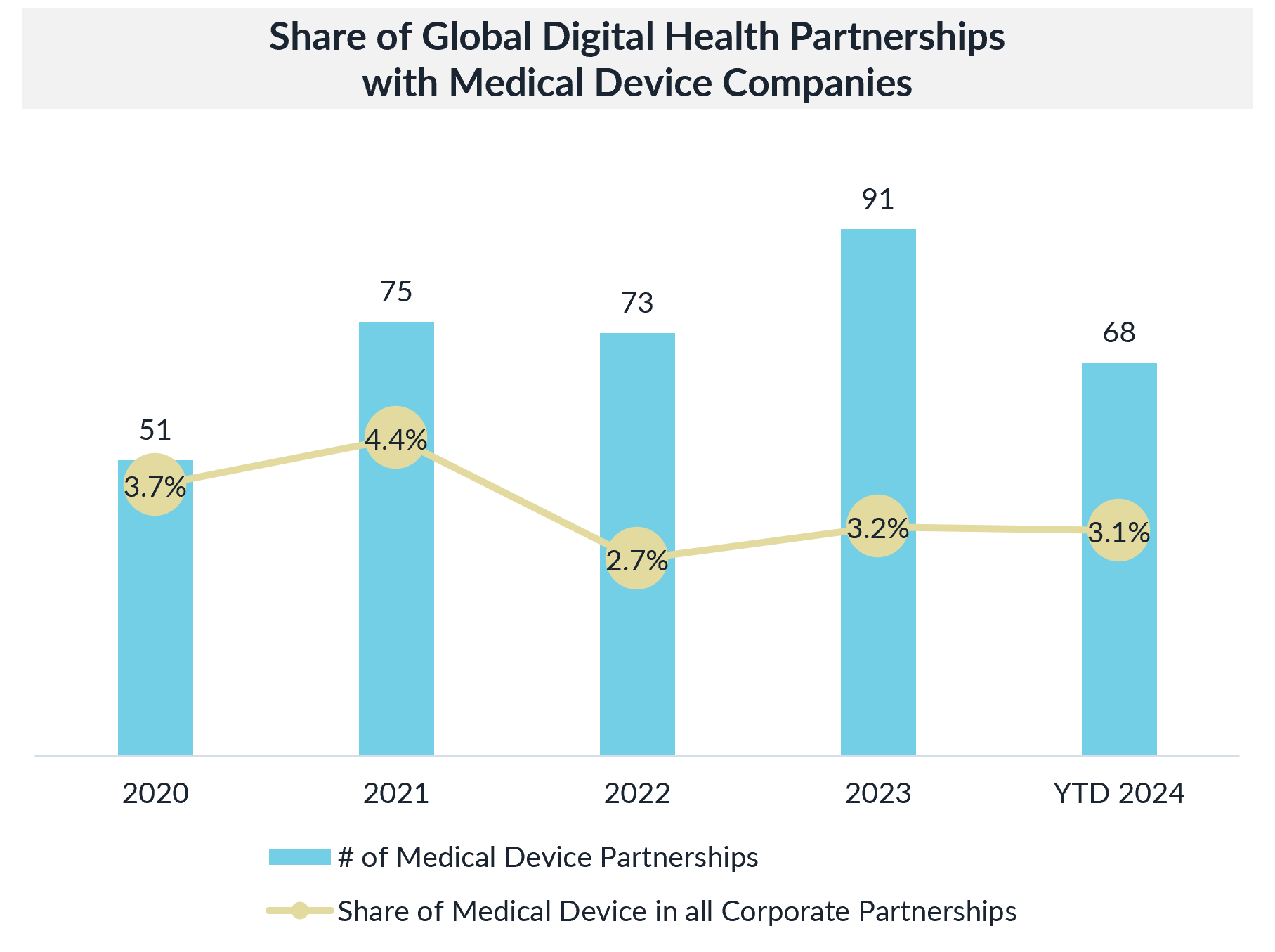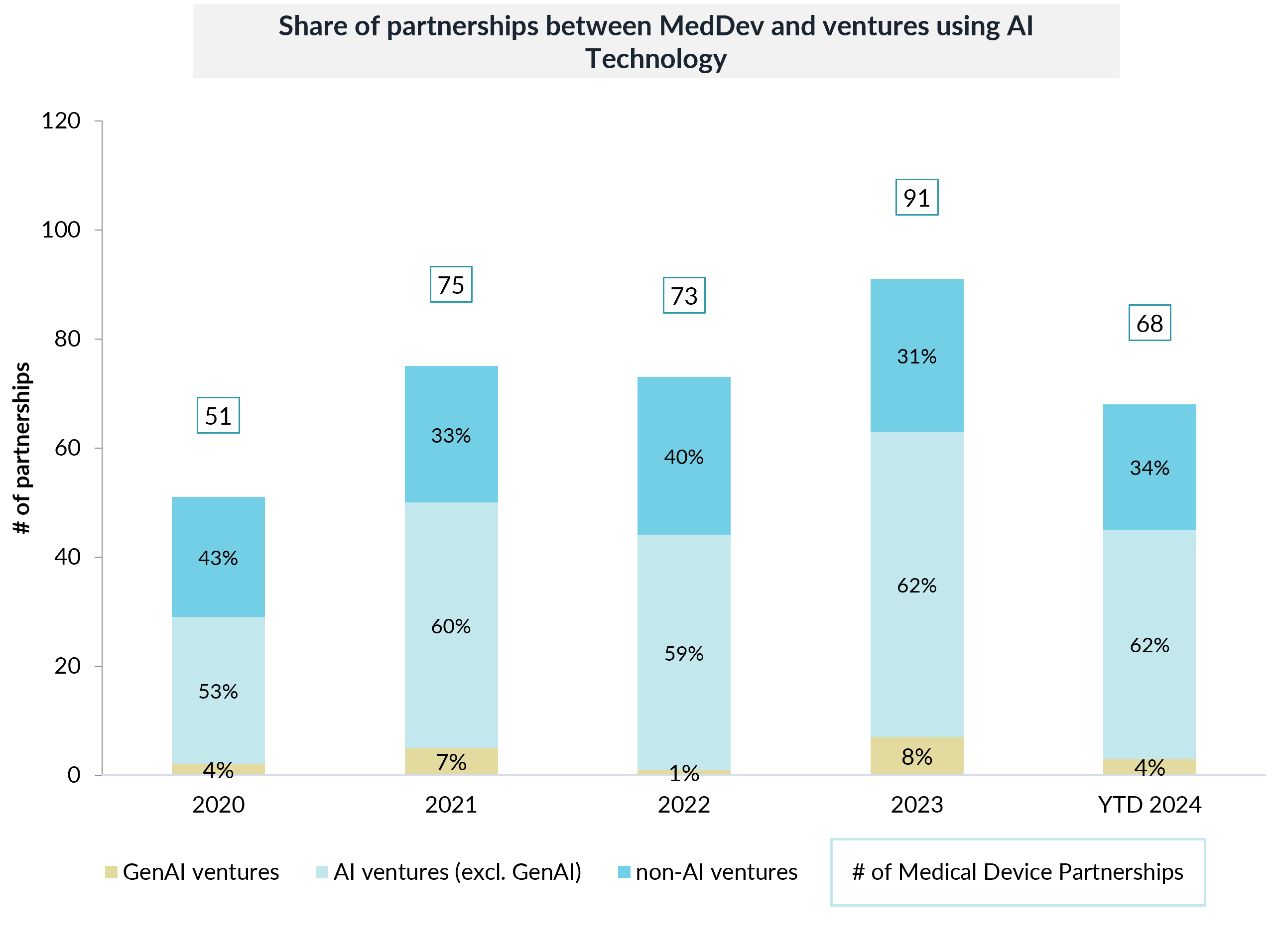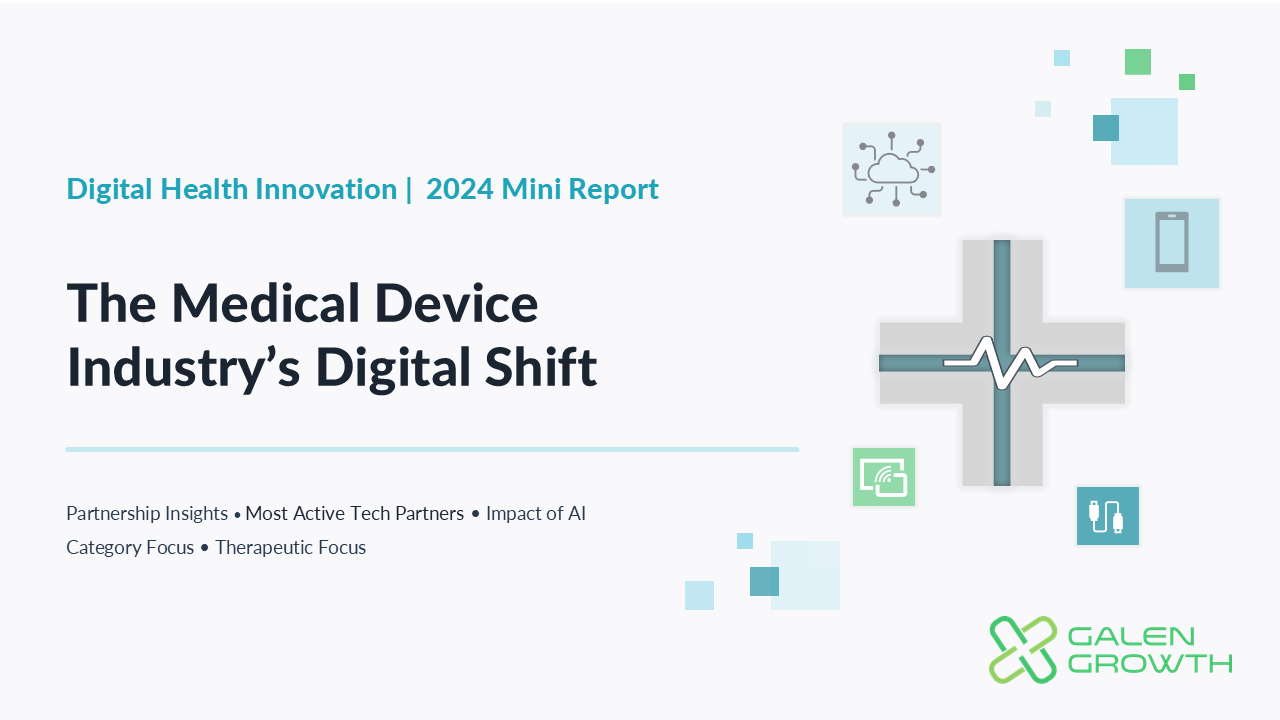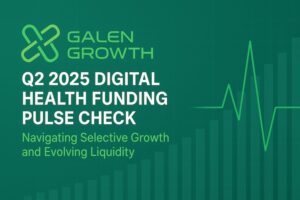Exploring the Rise of AI-Driven Innovations and Strategic Partnerships in the Medical Device Industry
TLDR
- The medical device industry increasingly embraces AI and digital health innovation, though it has historically lagged behind other healthcare sectors.
- From 2020 to 2023, AI-driven partnerships in the medical device sector increased significantly, highlighting the growing role of technology in healthcare.
- Medical diagnostics and health management solutions are key areas where digital health is revolutionising the medical device landscape.
- The rise of remote trials and the use of digital endpoints has increased medical device companies’ interest in partnering with digital health ventures focused on clinical trial management.
- The US leads digital health partnerships with medical device companies, while Europe and Asia-Pacific are gradually catching up.
The healthcare sector has been rapidly transformed by digital health innovation, yet the medical device industry has historically lagged in adopting these advancements. Focused predominantly on hardware, medical device companies have slowly integrated artificial intelligence (AI), generative AI (GenAI), and other digital technologies into their product offerings. However, this is beginning to change as more firms recognise the strategic benefits of partnering with digital health startups and embracing new technologies.
Galen Growth’s most recent short report, titled: “The Medical Device Industry’s Digital Shift”, explores how medical device companies are shifting towards digital transformation, the impact of AI and GenAI, and what this means for the future of healthcare.
Why the Medical Device Industry Has Been Slow to Adopt Digital Health
Despite the potential of digital health solutions, the medical device industry has been historically cautious about adopting digital technologies. This hesitation can be attributed to several key factors:
- Regulatory complexity: Strict regulations in the medical device sector have traditionally made it difficult to implement fast-evolving digital technologies. Companies must ensure that any new device meets the highest standards for safety and efficacy, making integrating AI and digital tools a slow process.
- Hardware-focused business models: Most medical device companies are built around the development and production of physical devices. Transitioning to a model incorporating software, real-time data, and AI-driven solutions requires a significant change in strategy and internal processes.
- Internal resistance: Many firms have encountered resistance from within. Adopting digital health technologies often means rethinking traditional product development lifecycles, which can be a daunting challenge for companies long accustomed to hardware-based models.
However, despite these challenges, there has been a marked increase in digital health partnerships within the medical device sector. Between 2020 and 2023, the number of collaborations between medical device companies and digital health startups nearly doubled, showcasing the industry’s growing recognition of digital transformation’s importance.

Between 2020 and 2023, the number of collaborations between medical device companies and digital health startups nearly doubled, while the industry share has decreased from 3.7% to 3.1%
The Role of AI and GenAI in Medical Device Innovation
One of the most significant shifts in the medical device industry is the growing adoption of artificial intelligence (AI) and generative AI (GenAI). By 2023, 70% of all medical device partnerships with digital health ventures were driven by AI-related collaborations, up from 57% in 2020.

A growing share of partnerships between medical device companies (MedDev) and ventures are utilizing AI technology. The percentage of AI-related collaborations increased from 57% in 2020 to 70% by 2023 (incl. GenAI).
AI and GenAI have the potential to revolutionise the medical device sector in multiple ways:
- AI-powered diagnostics: AI transforms medical diagnostics by enabling devices to process complex datasets and make real-time decisions. This can drastically improve diagnostic accuracy, allowing clinicians to detect diseases like cancer or cardiovascular issues earlier and more precisely.
- Predictive analytics: Generative AI can create predictive models based on patient data, helping healthcare providers anticipate complications and optimise treatment plans.
- Machine learning: AI-driven devices can continuously learn and improve, enabling medical devices to evolve alongside patient needs. This technology allows for the development of more adaptable and personalised devices.
The integration of AI into medical devices not only enhances their capabilities but also ensures that they remain competitive in an increasingly digital health ecosystem. Download Galen Growth’s full report on AI in Digital Health.
Medical Diagnostics and Health Management: Leading Digital Transformation
Medical diagnostics has emerged as a critical area where medical device companies are leveraging digital health innovation. Medical diagnostics ventures account for 35% of all digital health partnerships within the sector. By incorporating AI into diagnostic devices, medical device companies are developing tools to analyse radiological images, genetic data, and other medical information more quickly and accurately.
For example, AI-driven diagnostic tools can assist physicians in interpreting complex data, offering second opinions, and reducing the likelihood of diagnostic errors. These tools are particularly valuable in high-stakes medical fields like oncology and cardiology, where early and accurate detection is critical.
In addition to diagnostics, health management solutions comprise 14% of the medical device sector’s digital health partnerships. These solutions aim to enhance efficiency in healthcare settings by streamlining workflows, reducing administrative tasks, and improving overall clinical operations. By integrating real-time data collection and AI-enabled data analysis capabilities, medical device companies can offer comprehensive solutions that benefit healthcare providers and patients.
The Rising Focus on Clinical Trials
Another significant trend is the growing focus on digital clinical trials. The rise of remote trials and the use of digital endpoints has increased medical device companies’ interest in partnering with digital health ventures focused on clinical trial management.
Remote clinical trials, enabled by digital tools, allow for more flexible and cost-effective research by reducing patient drop-off rates and improving data collection methods. Additionally, digital endpoints such as wearable devices and remote monitoring tools play a critical role in gathering real-world evidence to assess the efficacy and safety of new medical devices.
These developments are a crucial step forward for the industry, as they reduce time-to-market for new devices and enhance the quality of data used in clinical evaluations. However, medical device companies must ensure the collected data is robust and adheres to regulatory standards to avoid potential setbacks.
Clinical Strength: A Declining Priority?
Interestingly, while there has been a surge in digital partnerships, there has been a notable decline in the focus on clinical strength within the medical device industry. Galen Growth defines clinical strength by peer-reviewed publications, regulatory approvals, and clinical trials. Since 2020, the share of venture partners for medical device companies with proven clinical strength has dropped by ten percentage points. Learn more about Clinical Strength in Digital Health in Galen Growth’s report.

Since 2020, the share of venture partners for MedDev companies with proven Clinical Strength has dropped by 10 percentage points.
This shift from clinical validation towards newer technologies like AI presents opportunities and risks. While AI-driven solutions hold immense potential for transforming healthcare, maintaining rigorous clinical validation remains essential to ensuring that new technologies meet safety standards and provide tangible benefits to patients.
Regional Trends: North America Leads the Charge
Regarding geographical trends, North America continues to dominate the landscape of medical device partnerships in digital health, with 58% of all collaborations involving ventures based in the United States. The Asia-Pacific region ranks second, with 21% of partnerships, while Europe trails behind with 15%.
This distribution reflects the innovation hubs in North America, particularly in Silicon Valley, where digital health and AI innovation are thriving. The medical device industry in the United States is leveraging the region’s robust technological infrastructure and expertise to drive its digital transformation.
In contrast, Europe’s slower adoption of digital health solutions can be attributed to regulatory hurdles and a lack of dominant tech champions. However, as the European Union ramps up its investment in healthcare innovation, this gap may begin to close in the coming years.
What Does the Future Hold for Medical Devices in Digital Health?
Looking ahead, the future of the medical device industry lies in its ability to fully embrace digital health technologies. To stay competitive, medical device companies will need to continue forming strategic partnerships with digital health ventures, particularly in AI, GenAI, and health management solutions.
However, the road to complete digital transformation is not without challenges. Medical device firms will need to overcome internal resistance, navigate complex regulations, and maintain a strong focus on clinical validation to ensure the safety and efficacy of their products.
As the medical device industry integrates AI and other digital health technologies, it is poised to play a central role in the future of healthcare. The sector has the potential to move beyond its hardware roots and become a leader in digital health innovation, where AI-driven solutions and data analytics enhance patient care, improve outcomes, and reduce healthcare costs.
Conclusion
“The Medical Device Industry’s Digital Shift” highlights that while the medical device industry has been slow to embrace digital health, the increasing number of AI-driven partnerships and the focus on medical diagnostics and clinical trials indicate that the sector is finally entering a new era of innovation. The question is not whether the medical device sector will go digital—it’s how fast and far it can go.
Reference: Download the 2024 Mini Report on The Medical Device Industry’s Digital Shift for more detailed insights on the Galen Growth research page. This comprehensive report provides an in-depth analysis of key trends, partnerships, and innovations shaping the future of digital health in the medical device industry.
Meta Description: Explore how the medical device industry is embracing AI, GenAI, and digital health innovation to transform medical diagnostics and health management solutions, driving a new era of healthcare technology.








